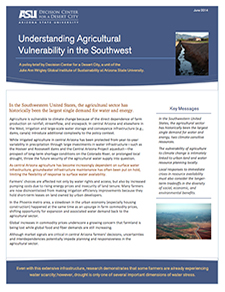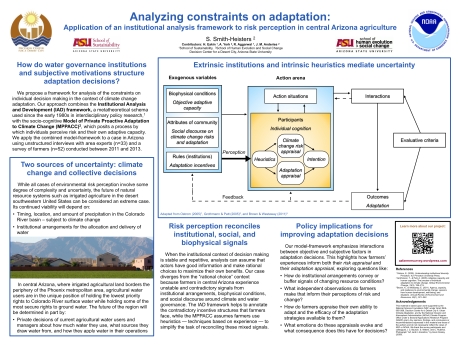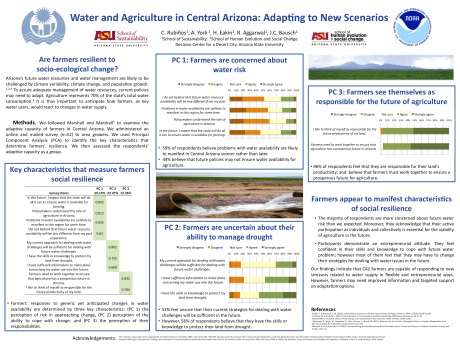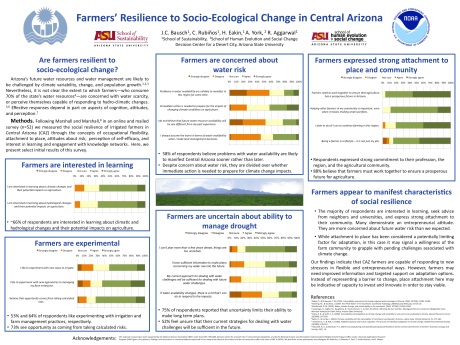 This week Decision Center for a Desert City (DCDC) at ASU is featuring a policy brief on their website that discusses some of the broader implications of our research on central Arizona agriculture.
This week Decision Center for a Desert City (DCDC) at ASU is featuring a policy brief on their website that discusses some of the broader implications of our research on central Arizona agriculture.
Visit DCDC’s website to read about and download a copy of “Understanding Agricultural Vulnerability in the Southwest.”
Thanks to interviewees Ron Rayner, Brian Betcher, Mike Lacey, and Dave White for sharing their time and expertise on water and agricultural issues for this new video produced by ASU News:
ASU researchers and local farmers discuss the issue of water usage in agriculture, which uses two-thirds of Arizona’s water demand.
Central Arizona has a rich history of agriculture, contributing $9.2 billion toward the state’s economy. That water has near-absolute power in determining the region’s fate is not an over-reaching assumption. With increasing urban development and uncertain climate, is this industry doomed or can it be sustained?
A news story accompanying the video states, in part:
The scientists found that most farmers in the region are educated, motivated, entrepreneurial producers who are eager to learn more about water conservation and irrigation improvement programs to ensure that agriculture remains an integral part of the state’s future. Yet, they feel they lack a voice.
“Farmers say their needs are not valued as much as those dealing with urban demands,” Eakin said. “Key players need to be asked pointed questions regarding what is desired and why, and the pros and cons of retaining an agrarian footprint in the region.”
and:
“States all over the Southwest are facing a similar situation,” she said. “A bigger picture that takes into consideration the benefits of agriculture, including food security, revenue, jobs and heat island mitigation, would help to inform the decision-making process that will ultimately lead to central Arizona’s sustainable future.”
Read the full accompanying story here on the ASU News site.
Poster presented at the American Association for the Advancement of Science meeting
February 17, 2014
Through the Decision Center for a Desert City (DCDC) we had another opportunity to present at the American Association for the Advancement of Science (AAAS) annual meeting, this year highlighting some more theoretical implications of the context in central Arizona agriculture.
Reference:
Smith-Heisters, S. (2014, 15 February). Analyzing constraints on adaptation: Application of an institutional analysis framework to risk perception. Poster presented at the AAAS 2014 Annual Meeting: “Meeting Global Challenges: Discovery and Innovation.” February 13-17, 2014. Chicago, IL.
Arizona Horizon cotton farming discussion
September 11, 2013
Watch ASU researcher Hallie Eakin discuss the role of cotton farming with Arizona Horizon host Ted Simons.
“Cotton Perspectives” in Green Living magazine
September 11, 2013
Read a feature on Arizona cotton farming in the September 2013 issue of Green Living.
To learn more about how water policies affect central Arizona farmers, researchers at Arizona State University (ASU) and the University of Arizona Cooperative Extension are collaborating on a study to understand farmers’ perspectives on water management.
“Assessing Agricultural Needs” in Arizona Water Resource
July 16, 2013
Find our guest view, “Assessing Agricultural Needs in a New Era of Climate Information,” on page six of the Summer 2013 newsletter of the University of Arizona Water Resources Research Center.
DCDC Water/Climate Briefing: The Dynamics of Energy and Water for Central Arizona Agriculture
May 8, 2013
We were very pleased to organize a great panel discussion about energy, water, and agriculture at the Decision Center for a Desert City (DCDC) on February 27, 2013 as part of the Water/Climate Briefing series. The expert panel included:
- Brian Betcher, General Manager, Maricopa Stanfield Irrigation & Drainage District
- Ed Gerak, General Manager, Buckeye Water Conservation and Drainage District
- Katosha Nakai, Manager, Tribal Relations & Policy Development; Business Planning & Governmental Programs; Central Arizona Project
- Ron Rayner, Partner/Manager, A Tumbling T Ranches
- Karen Smith, Fellow, Grand Canyon Institute
You can watch the video of the discussion here: http://vimeo.com/61281649
We owe a big thank you to the panelists for sharing their time and expertise, as well as to DCDC (especially Liz Marquez and Sarah Jones) for hosting and helping us organize the event, and all those who attended. We learned a lot, and hope you will, too!
Reference:
The Dynamics of Energy and Water for Central Arizona Agriculture. (2013, 27 February). Panel discussion, DCDC Water/Climate Briefing. http://dcdc.asu.edu/outreach/waterclimate-briefings/
Our project sent two posters to the Water Resources Research Center (WRRC) Annual Conference in Tucson, AZ in March 2013.
Cathy Rubiños, a graduate research assistant on the project, built on the poster Chrissie presented at AAAS, presenting a more advanced analysis of the results from the project’s survey with Central Arizona farmers.
Reference:
Rubiños, C., York, A., Eakin, H., Aggarwal, R.M., Bausch, J.C., Skaidra Smith-Heisters, Smith-Heisters, S., Waters, S., & Anderies, M. Water and Agriculture in Central Arizona: Adapting to New Scenarios. Water Resources Research Center 2013 Annual Conference, University of Arizona. March 5, 2013. Tucson, AZ.
Skaidra Smith-Heisters, a graduate research assistant on the project, presented this poster exploring agricultural water use as an example of the private provisioning of public goods:
Reference:
Smith-Heisters, S., York, A.M., Bausch, J.C. (2013, 5 March) Private Provisioning of Public Adaptation Goods: The Case of Irrigated Agriculture in Central Arizona. Poster presented at “Water Security from the Ground Up,” Water Resources Research Center 2013 Annual Conference, University of Arizona. March 5, 2013. Tucson, AZ.
Poster presented at the American Association for the Advancement of Science, February 2013
February 20, 2013
Julia “Chrissie” Bausch, a graduate research assistant on the project, presented this poster at the American Association for the Advancement of Science (AAAS) annual meeting in February, 2013. This poster describes and discusses select preliminary results from the survey we did with Central Arizona farmers.
Reference:
Bausch, J.C., Rubiños, C., Eakin, H., York, A.M., & Aggarwal, R.M. (2013, 17 February). Farmers’ Resilience to Socio-Ecological Change in Central Arizona. Poster presented at the AAAS 2013 Annual Meeting: The Beauty and Benefits of Science. February 14-18, 2013. Boston, MA.
Student workshop report on urban/agricultural engagement
December 20, 2012
Read an engagement strategy authored by students in Hallie Eakin’s Fall 2012 workshop on adaptation, resilience, and transformation at Arizona State University.







